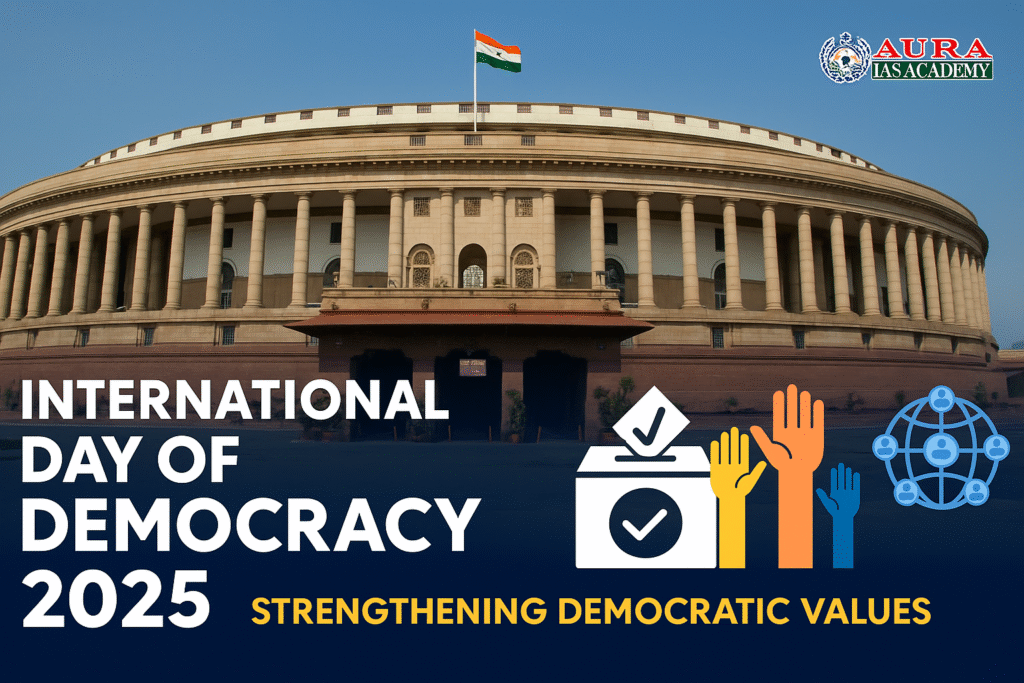International Day of Democracy 2025 – Strengthening Democratic Values Worldwide

The International Day of Democracy is celebrated every year on 15th September to reaffirm the universal values of freedom, equality, and human rights — the core foundations of democracy.
The day highlights the need for transparent governance, active citizen participation, and accountability in political systems. For UPSC aspirants, the theme resonates strongly with topics from GS Paper 2 (Polity, Governance) and GS Paper 4 (Ethics – Values in Public Administration).
Background
The United Nations General Assembly (UNGA) established the International Day of Democracy in 2007 through a resolution encouraging all member states to strengthen democratic principles and practices.
This observance emerged from the Universal Declaration on Democracy (1997) adopted by the Inter-Parliamentary Union (IPU), emphasizing that democracy is not limited to periodic elections — it is a culture of participation, inclusiveness, and dialogue.
Theme of International Day of Democracy 2025
The theme for 2025 is “Empowering Citizens in the Digital Era.”
It underlines how technology and social media can be both a tool for democratic participation and a challenge to truth, privacy, and accountability. In an age where misinformation spreads fast, the role of digital literacy, ethical AI governance, and responsible media becomes critical.
Democracy and India’s Constitutional Vision
India, the world’s largest democracy, reflects the essence of this day in both spirit and practice. The Indian Constitution embodies democratic ideals through:
Preamble: Justice, Liberty, Equality, and Fraternity
Fundamental Rights (Part III): Protecting individual freedoms
Directive Principles (Part IV): Promoting welfare and inclusivity
Free & Fair Elections: Conducted by an independent Election Commission of India (ECI)
However, sustaining democracy requires more than institutions — it needs citizens who are informed, ethical, and participatory.
Challenges to Democracy
Despite progress, democracies worldwide face several contemporary challenges:
⚠️ Erosion of trust in political institutions
⚠️ Misinformation and fake news in digital spaces
⚠️ Money power influencing elections
⚠️ Polarization weakening pluralism
⚠️ Low civic participation and apathy among citizens
For India, addressing these issues is crucial to maintaining the vibrancy and inclusiveness of its democratic framework.
India’s Efforts to Strengthen Democracy
🇮🇳 Key Measures and Initiatives:
Digital India & e-Governance for transparency
Right to Information (RTI) Act, 2005
Lokpal and Lokayuktas Act, 2013
Election Reforms: Use of EVMs, VVPATs, and awareness drives
Citizen-centric platforms such as MyGov and PRAGATI
These initiatives ensure citizens have both voice and visibility in the decision-making process.
UPSC Relevance
GS Paper 2: Polity, Governance, Constitution, Civil Rights
GS Paper 4: Ethics in Public Administration, Accountability
Essay Paper: “Democracy is not merely a form of government, it is a way of life.”
💡 Example Question:
“Discuss how digital technology can strengthen as well as challenge the democratic process in India.”
Conclusion
Democracy thrives not merely through institutions but through the active participation of citizens. On International Day of Democracy 2025, let’s reaffirm our commitment to uphold transparency, pluralism, and the rule of law — values deeply embedded in the Indian Constitution.
As Dr. B.R. Ambedkar aptly stated, “Democracy is not a form of government, but a form of social organization.”
📘 For UPSC Students – Recommended Reading
Aura IAS GS Paper 2 PYQs & Model Answers (2013–2025)
Topic-wise questions on Polity, Governance, and Democracy
Includes model answers aligned with UPSC’s analytical standards
🛒 Get your copy here:
👉 https://auraias.in/shop/



